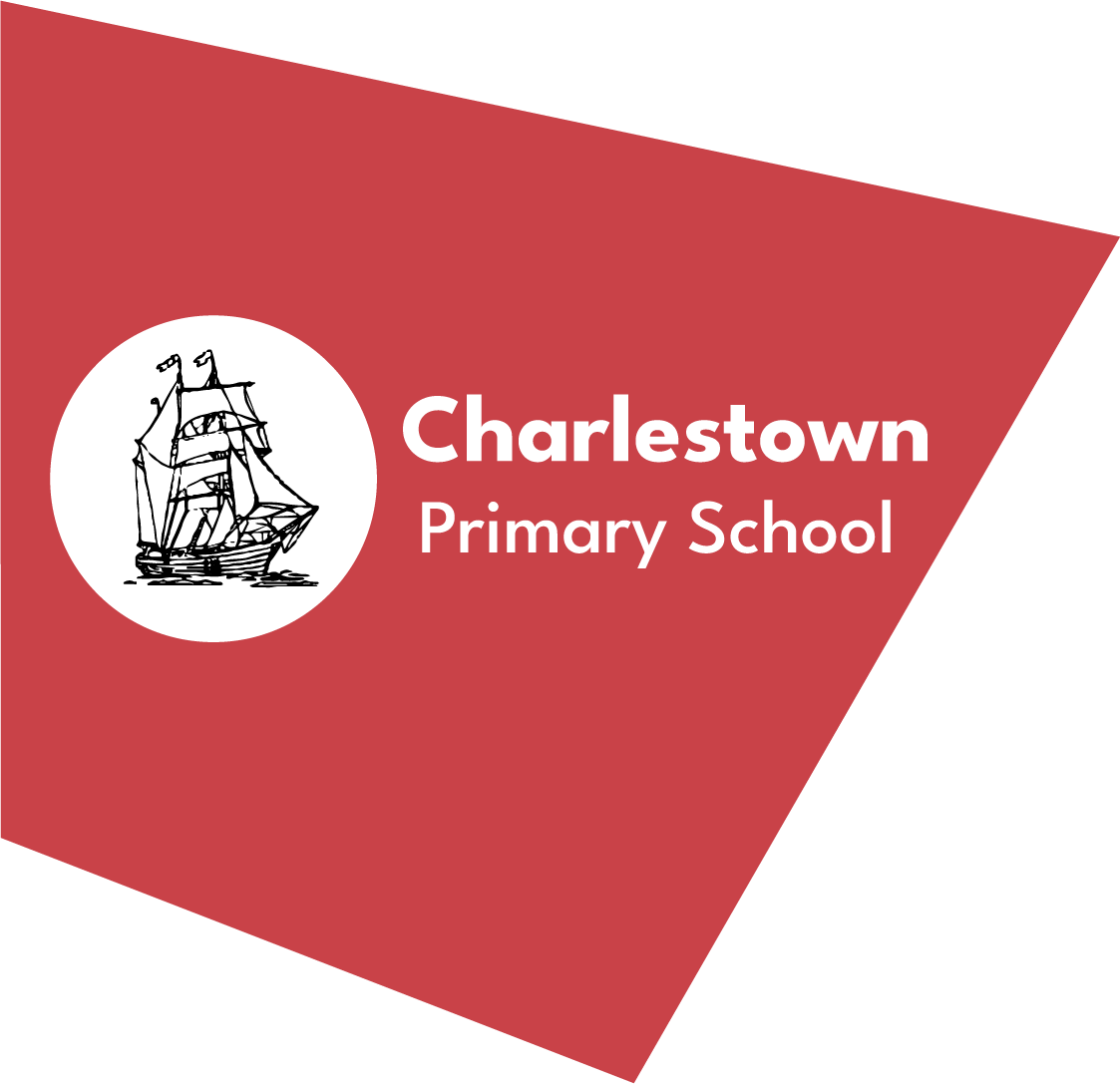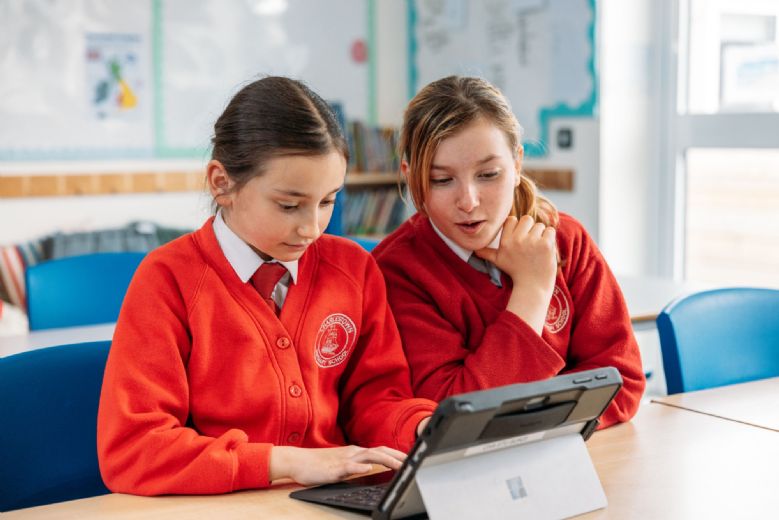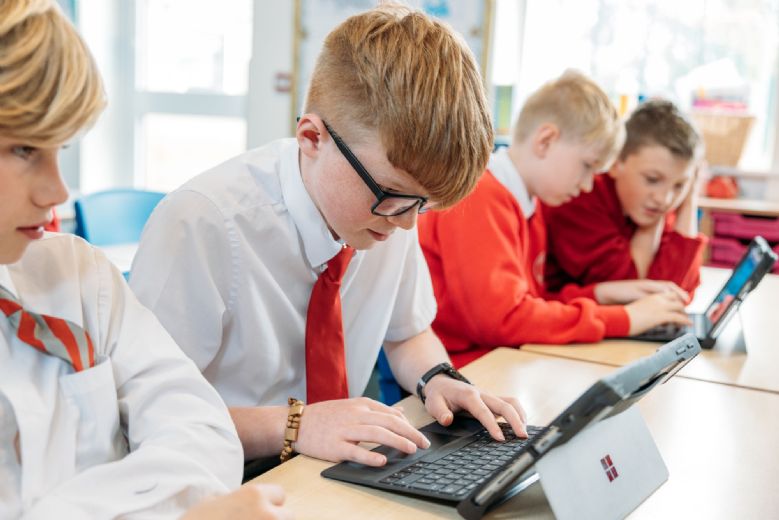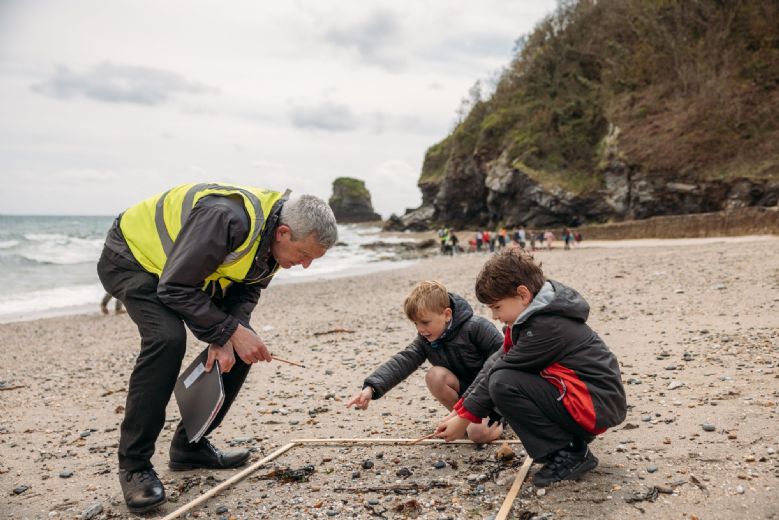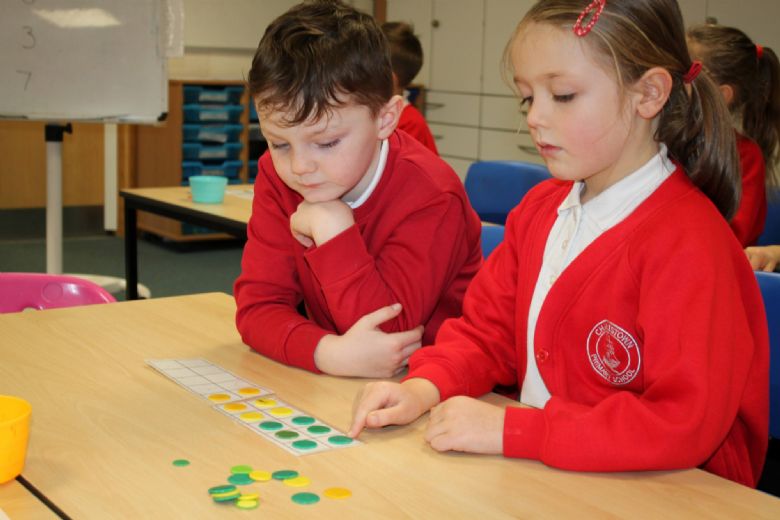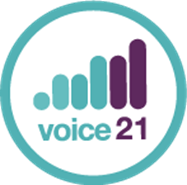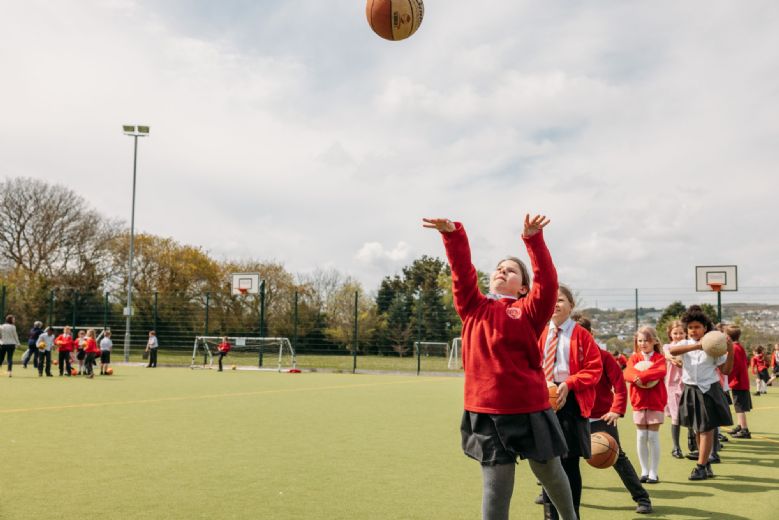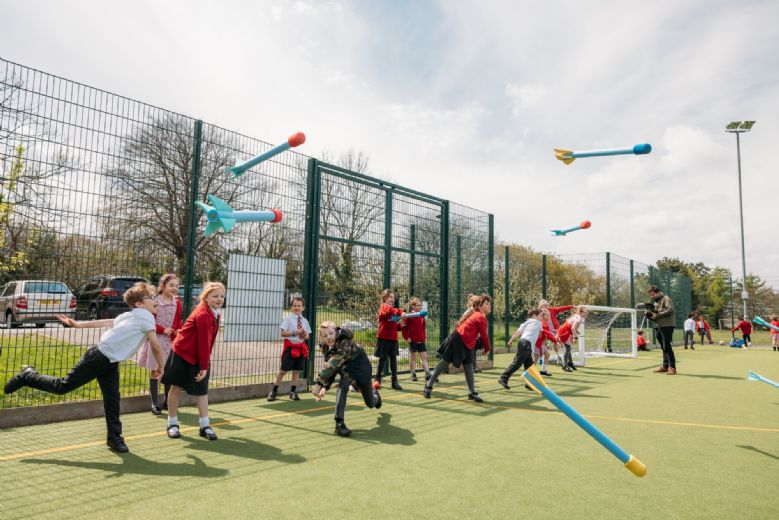
Subject Information
Please click on a subject below to read about how we teach that subject in each year group.
Whole School Curriculum Coverage
Art
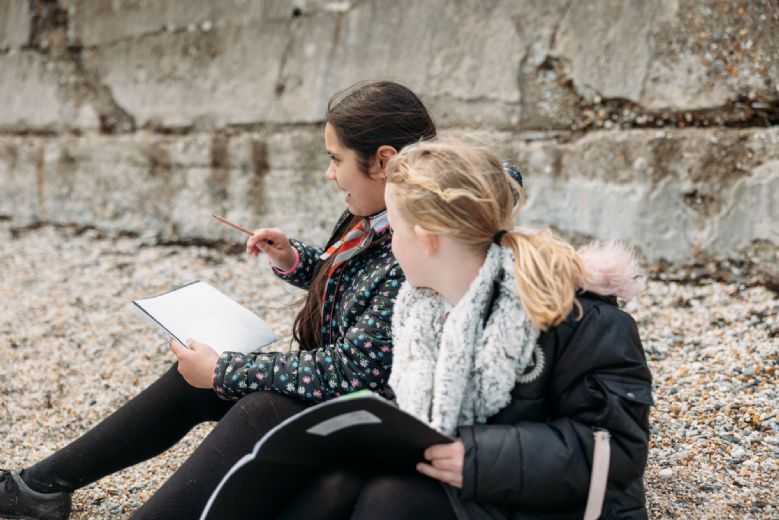
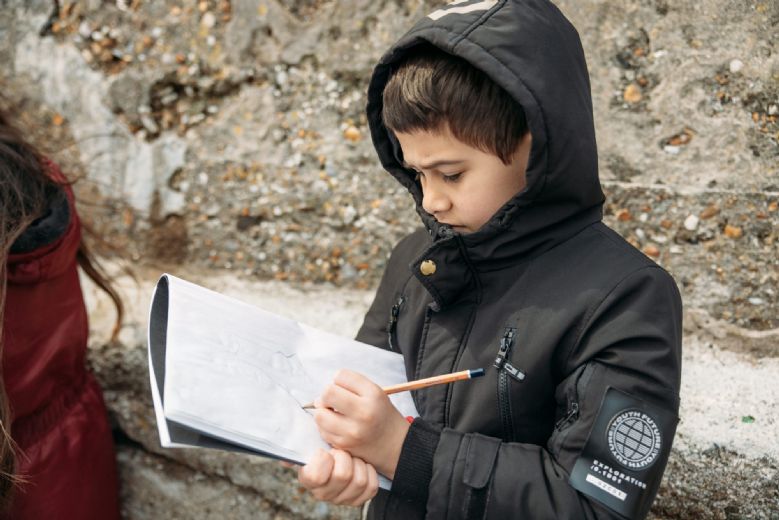
‘The painter has the universe in his mind and hands’ Da Vinci
Intent:
At Charlestown, our Art and Design provision ensures every child can reach their full potential. We encourage children to use their creativity and imagination to design and make pieces of art within a variety of contexts through using a range of different media and resources. We intend for children to experience various genres, artists and visual forms of art, with the aim of them becoming proficient in using within and developing their own, personal style.
Implementation:
At our school, children use sketchbooks to document their exploration and refinement of artistic techniques, fostering creativity and skill development. Through a variety of high quality oral, creative and practical activities, we teach the knowledge, understanding and skills needed to engage in an interactive process of designing, creating and evaluating. Each unit includes opportunities to:
Design – use research and develop design criteria to design for a purpose and communicate their ideas through a range of mediums.
Create – use a wider range of tools and equipment with accuracy and use a wider range of materials and components according to their qualities
Evaluate – evaluate their ideas and pieces against their own design criteria and consider the views of others to improve their work.
Impact:
All children will be taught the skills and knowledge outlined in the National Curriculum, as well as the sub-skills presented in the Charlestown Primary School Art Curriculum (based on Chris Quigley’s The Essentials Curriculum). Throughout their time at Charlestown, children will know more, remember more and understand more about Art and Design. Children should be able to retain prior-learning and explicitly make connections between what they have previously learned and what they are currently learning. Children should also become confident in designing, creating, evaluating and articulating their learning and progress. Furthermore, teachers are to ensure that lessons are planned and resourced thoroughly in ample time to cater for children of all needs. At Charlestown, we value pupils’ creative interests and expressions of self through the medium of art and empower them to take risks and pursue their future creative journey with necessary skill and confidence.
What do pupils at Charlestown say about learning in art?:
Year 3 – Art lessons are my favourite lessons! I love to draw and be creative.
Year 5 – I really enjoy art lessons because you get to let your imagination go wild!
Year 5 – I like looking at different styles and artists – they are inspirational.
Year 6 - Art lessons are fun because you get to look at different materials and textures.
Curriculum Documents
Computing
‘Technology is incredibly powerful. And in many ways, the sky is the limit in terms of what you can actually accomplish with the right science and the right technology.' Ramez Naam
'A computer is like a violin. You can imagine it making beautiful music, but you have to learn how to play it.' Bill Gates
Intent:
At Charlestown, our Art and Design provision ensures every child can reach their full potential. We encourage children to use their creativity and imagination to design and make pieces of art within a variety of contexts through using a range of different media and resources. We intend for children to experience various genres, artists and visual forms of art, with the aim of them becoming proficient in using within and developing their own, personal style.
Implementation:
At Charlestown Primary, the curriculum for computing, including E Safety, has been organised to ensure progression of skills and understanding year on year. Using the National Curriculum, we aim to ensure all children are equipped for the digital world.
This has been written with the three core areas of Computing in mind:
- Computer Science – the understanding of coding and programming across a range of physical devices and digital resources.
- Information Technology – the range of skills required to operate and manipulate specific programs, systems, and content.
- Digital Literacy – the knowledge required to use technology safely and to evaluate and react to any potential risks of the online/digital world.
In computer science, the children will develop their knowledge of language for computing before working with variables and programming to solve problems. To support this, we use a variety of lessons from Barefoot Computing, Teach Computing and coding units from Espresso Coding (Discovery Education). Our digital literacy, taught through Project Evolve, will teach the pupils become global citizens of technology understanding how to stay safe and evaluate online content. Finally, in the information technology area of the curriculum the pupils will put their skills into practice and be creative using different programs, apps and software. Here we provide the pupils with a variety of software on a range of digital devices to design, create and find solutions to problems. This includes collecting, analysing, evaluating and presenting data, before using their computer science skills to find a solution and improve their creation. An example of this is using Espresso Coding to move an ‘object’ around the screen with variables to count scores to create online games for younger children.
Impact:
Through the implementation of our curriculum and the use of our hardware and software available throughout the school, children at Charlestown Primary will be digitally literate and able to go out into the world understanding digital platforms. This will not only include using a range of software and hardware products, but also the fundamentals of computer science, such as abstraction, algorithms and tinkering. Children will be able to use various systems and apply problem solving techniques, including through coding, to create digital artefacts.
Through our Project Evolve lessons, the children will become more confident in their computing ability as well as ensuring they have a secure understanding of the positive applications and specific risks associated with a broad range of digital technology to stay safe and respect others online. As children become more assured in their abilities in Computing, they will become more independent and key life skills such as problem-solving, logical thinking and self-evaluation become second nature. Pupils of Charlestown Primary School should be able to transition to secondary school with a keen interest in the continued learning of this subject.
What do pupils at Charlestown say about learning in computing?:
“My computing lessons on staying safe online have helped me because they help me identify what is unsafe online and I know who to go to if I don’t feel safe.” Isla C – Year 6
“I really like computing, especially coding because I like controlling objects and making them come to life.” Naomi L – Year 5
“I enjoy making my own game and app in the coding lessons.” Reuben W – Year 3
“I find it useful to know how to stay safe online when having screen time at home.” Jemima M – Year 3
“I like computing because when I code on the iPads, I can move objects around the screen.” Morgan L - Year 1
Curriculum Documents
Design Technology
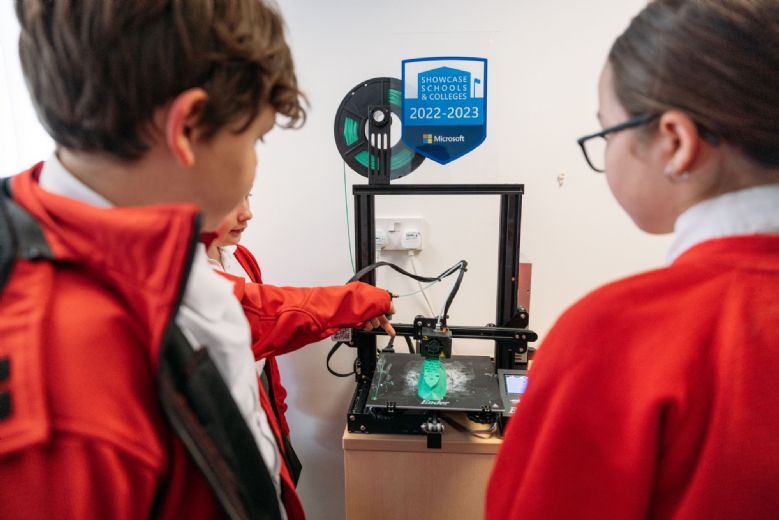
Introduction to Design Technology
Design Technology often links to other subjects. For example, we link history learning about WW2 with rationing and learning about foods that were grown and cooked during the war. Of course there are other links to maths (measuring) and art (designing).
The key to the process is the evaluation - how can we improve what we have designed? As with all other areas of our learning, we try to make DT as exciting as possible.
Curriculum Documents
Geography
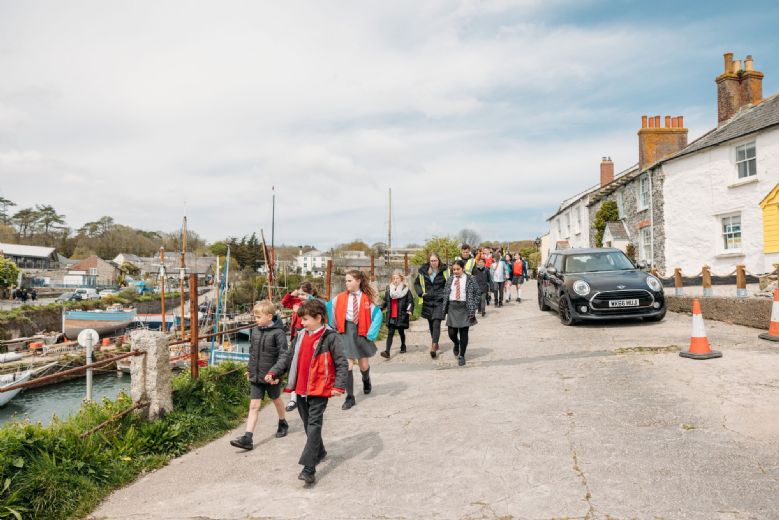
Introduction to Geography
Curriculum Intent
At Charlestown, we believe that Geography helps to provoke and provide answers to questions about the natural and human aspects of the world. Children are encouraged to develop a greater understanding and knowledge of the world, from their local everyday experience to the global picture, as well as their place in it. The Geography curriculum builds their sense of what is where in the world and the ways in which things are connected – and why. We want our children to be aware of the environmental and humanitarian issues facing our planet and understand that their daily lives and actions have an impact. We want them to become thinking, questioning and responsible people both now and in the future. We want our children to feel a sense of place, belonging and pride in their local community and Cornwall as a whole and to appreciate we are both unique and connected to the wider world. We also aim to provide our children with the skills, knowledge and vocabulary to pose and answer questions confidently, clearly and accurately.
Curriculum Implementation
Our curriculum is designed to ensure breadth, balance and coherence. Through carefully considered units which weave throughout our wider curriculum, our children are given the wide contextual knowledge needed to locate and place new learning and make meaningful connections. At the beginning of each unit prior learning is revisited to make links between what they already know and new learning. This also ensures our children have an understanding of the large context and the deeper detail.
In addition, most year groups have a unit exploring our locality, such as “What can we find in our local area?” in Year 1, the impact of flooding in Boscastle and features of the Pentewan river in Year 3, how erosion has affected Charlestown’s coast in Year 4 and our village and how places in Cornwall are becoming more sustainable in Year 6.
Opportunities for fieldwork in each year group have been identified to ensure progression. We believe fieldwork is of great importance not only in making use of and understanding our local area but in developing the problem solving skills of our learners.
In order to ascertain misconceptions and elicit prior learning, retrieval questions are completed at the beginning of each unit to help teachers establish what has been stored in our children’s long term memory from previous lessons. Key vocabulary is explicitly taught at the beginning of each unit, to ensure children can access and understand taught material and also communicate their own learning clearly and accurately. Geography lessons are delivered across three half terms per year and lessons are taught in weekly lessons for about an hour. However, teachers may decide to block lessons together if they feel it would benefit the learning.
Curriculum Impact
At Charlestown, our children will have excellent locational knowledge and knowledge of geographical processes and human and physical features. They will be able to articulate their learning clearly supported by accurate facts and precise vocabulary. They will know more and remember more and will be prepared for the next step of their learning journey.
They will appreciate the interconnections between people and places and between history and geography and will understand that their own impact on their locality and the wider world. Our children will be able to make informed choices about how they live and be responsible global citizens, understanding how they can take action to improve and protect their world. They will have a clear sense of who they are within their local, regional, national and global communities and will celebrate both their differences and similarities within them.
Through enquiry based learning our children will be confident in asking questions and have the necessary skills to answer them. They will have developed problem solving skills and be able to carry out investigative work both independently and collaboratively.
Curriculum Documents
History
'We are not makers of history. We are made by history’ Martin Luther King Jnr.
Intent:
At Charlestown Primary School, we want all pupils to enjoy learning about the past, from a range of sources, so that they eagerly develop an understanding of how past events and people have shaped our world today (whilst being aware that not all sources of evidence are accurate).
We want Charlestown pupils to understand the integral part that their local history has had on their direct life experiences, supporting them to feel a sense of identity within their community, and a connection to their ancestors and those around them in their present, day-today lives.
Implementation:
Key Stage History is used as primary resource to support the high-quality teaching and learning of the History National Curriculum (2014) at Charlestown Primary School. The content of the National Curriculum is broken down into progressive knowledge, vocabulary and skills appropriate for each year group. This ensures the curriculum sequence from EYFS to Year 6 is progressive and builds on previous knowledge and skills.
The golden threads (schema) are carefully considered as key themes throughout the history curriculum at Charlestown, to ensure these concepts draw on previous learning, whilst challenging children's understanding of these concepts in new contexts. For example, in EYFS, pupils explore ‘settlements and civilisations’ when learning about farming. They are exposed to the same concept, year on year, when exploring changes in seaside, tourism and piracy in KS1 and the Egyptians, Romans and Vikings throughout KS2.
Children begin to develop an understanding of chronology in EYFS when considering whether events have happened in the past or present. Throughout KS1 they investigate this further when referring to events that have happened within ‘living memory’ or long ago. Learning in KS1 starts with our locality, providing tangible meaning to our pupils (e.g. seaside holidays and how they have changed over time) and then broadens their understanding to national historical events, for example the Great Fire of London and Gunpowder Plot.
In KS2, this understanding of chronology is developed further as children explore significant historical eras and civilisations in chronological order from Years 3 to 6. They also start to broaden their contexts from local and national events, eras and civilisations to the wider world. Comparisons help children to develop an awareness of how historical world events have shaped our life experiences today.
Regular assessment within the lessons helps to inform planning throughout the teaching sequence. Teachers adapt to the needs of the pupils, addressing gaps in learning before progressing further or challenging those who need stretching – ensuring an ambitious curriculum for all. Furthermore, distanced end of unit checks are completed to check what children have remembered and what content may need to be revisited to consolidate learning and secure this to the pupils’ long term memory.
Children’s learning is inspired with enriching activities that support their understanding of the subject. This ranges from visits to specific locations, areas and attractions in the locality to drawing on specific workshops and visits to places further afield, for example Museums. Artefact boxes are used to provide ‘hands-on’ exposure to sources of evidence within the learning environment and where possible, we draw on ‘real-life’ sources such as visitors to help educate our pupils through quality discussions and question and answer sessions e.g. WWll evacuees visiting our Year 6 pupils.
Impact:
At Charlestown, through well sequenced teaching and learning of History, plenty of opportunity for pupils to use and apply their historical knowledge and skills independently, and assessment which ensures an ambitious curriculum for all, we aim for pupils to:
- Apply historical skills to learning beyond the History lesson e.g. using sources of evidence to develop and support understanding
- Articulate their understanding of historical events, era and civilisations independently and with confidence
- Understand how world history affects our living experiences today
- Understand the importance of reliable sources of evidence
- Show ‘pride, passion, participation and perseverance’ in their learning
- Make progress that exceeds national expectations
- Enjoy History and understand it is not us who creates the history of the future but rather the history which makes us.
What do pupils at Charlestown say about learning in history?:
Children express their enjoyment of history, talking fondly of the subject particularly their learning about The Romans and WWll.
“I do like History because sometimes it is quite exciting. It is fun to learn and it is tricky. You know what’s happened in the past and you can talk about it.”
“I think its so interesting to look at the different artefacts. I can’t believe how life is so different now but that some things are still the same.”
“I really love history because I really like finding out about things which have happened in the past, sometimes right where you’re standing! I like finding things out that have happened to other people.”
Curriculum Documents
Maths
‘Maths is all about being a creative thinker, not a calculator’ Anonymous.
Intent:
At Charlestown primary School, we want all pupils to enjoy Maths learning, whether in the classroom or beyond. We want our pupils to recognise that Maths is important not only in school but as an important life skill throughout their journey. Maths can be tricky so by learning how to solve Mathematical problems and building resilience, we want our pupils to apply the same grit and determination in all that they pursue; demonstrating a growth mindset when faced with challenges. By developing an understanding of relationships between number and the tools (resources) that can be used to solve Maths problems, we want our pupils to ‘master’ their mathematical understating and feel confident that they have the toolkit to approach new challenges.
Implementation:
White Rose Maths and Number Sense are used as primary resources to deliver the Mathematics National Curriculum (2014) at Charlestown Primary School. The content of the National Curriculum is broken down into ‘Declarative, Procedural and Conditional’ knowledge to ensure children are secure in their understanding before moving on to the next phase e.g. ‘not running before they can walk’. Children need to have a secure understanding of age-appropriate declarative (number) facts before they can progress to using these facts to support their procedural understanding (methods) and later using and applying these skills to demonstrate their conditional knowledge when problem solving.
The planning and teaching of the curriculum using White Rose, whilst considering the pupils’ learning journey and application of Mathematical knowledge, skills and understanding (declarative, procedural, conditional) is underpinned and supported by our Calculation Policy.
The policy clearly shows the progression in the four operations and how they are taught in each year group, providing consistent methods and vocabulary across the school from EYFS to Year 6. This document also outlines how to support and adapt teaching to support or challenge the learning of all pupils presenting calculations in concrete, (manipulatives), pictorial and ‘abstract’ (numerals) form.
Regular assessment within the lessons helps to inform planning throughout the teaching sequence. Teachers adapt to the needs of the pupils, addressing gaps in learning before progressing further or challenging those who need stretching – ensuring an ambitious curriculum for all. Furthermore, distanced end of unit checks are completed to check what children have remembered and what content may need to be revisited to consolidate learning and secure this to the pupils’ long term memory.
Groupings in Maths are flexible and change daily depending on the assessments made in the same / previous lesson either through teacher or support staff observation, verbal feedback given or books being marked following the lesson.
Impact:
At Charlestown, through well sequenced teaching and learning of Mathematics, plenty of opportunity for pupils to use and apply their mathematical knowledge and skills independently, and assessment which ensures an ambitious curriculum for all, we aim for pupils to:
- Apply mathematical skills to learning and experiences beyond the Maths lesson
- Articulate their learning independently and with confidence
- Show ‘pride, passion, participation and perseverance’ in their learning by challenging themselves further (growth mindset)
- Know which concrete manipulatives, pictorial representations and resources can help them to solve problems
- Achieve a Good Level of Development in Early Years that is line or above national
- Achieve Age Related Expectations that is line or above national both in KS1 and KS2
- Know their times tables facts up to 12 x 12 and pass their Multiplication Check in year 4
- Make progress that exceeds national expectations
- Enjoy Mathematics and understand it is much more than ‘being a calculator’. The skills it requires, help us to think creatively.
What do pupils at Charlestown say about learning in maths?:
Children express their enjoyment of mathematics and are eager to showcase their learning to visitors, explaining their strategies for overcoming difficulties with confidence. They can articulate how flexible groupings and the marking policy support their learning and helps them to identify ‘juicy’ mistakes.
Curriculum Documents
Modern Foreign Languages
'To learn a language is to have one more window from which to look at the world’
Intent
At Charlestown Primary School we believe that the learning of a foreign language provides a valuable educational, social and cultural experience for our pupils. It helps them to develop communication skills and extends their knowledge of how language works. Learning another language gives children a new perspective on the world, encouraging them to understand their own cultures and those of others.
Taking this into consideration Charlestown Primary school aims to enhance pupils’ awareness of the multilingual and multicultural world in which we live. Through the introduction of an international dimension to their learning, pupils will be given an insight into their own culture and those of others. They will also develop linguistic competence, extending their knowledge of how language works and exploring differences and similarities between the other languages and English.
Our curriculum is sequenced to:
- offer progressive coverage of the skills required by the national curriculum.
- introduce children to the culture of Spanish-speaking countries and communities.
- foster children’s curiosity and help deepen their understanding of the world.
- allow opportunity for children to gradually build on their skills.
- enable children to express their ideas and thoughts in Spanish
- provide opportunities to interact and communicate with others both in speech and in writing.
- expose children to authentic Spanish
- to provide regular opportunities to listen to native speakers (through lessons).
In Lower KS2,
- children acquire basic skills and understanding of French with a strong emphasis placed on developing their Speaking and Listening skills. These will be embedded and further developed in Upper KS2.
In Upper KS2,
- alongside Reading and Writing, gradually progressing children onto more complex language concepts and greater learner autonomy.
- to inspire pupils to develop a love of languages and to expand their horizons to other countries, cultures and people.
- help children grow into curious, confident and reflective language learners provide them with a foundation that will equip them for further language studies.
Implementation:
To assist with the delivery of our curriculum, teachers use ‘The Primary Languages Network’ to support lesson structure and provide high quality resources for learners.
Lessons are sequenced so that prior learning is considered and opportunities for revision of language and grammar are built in.
Our curriculum is implemented in a way that allows children to:
- build on prior knowledge alongside the introduction of new skills.
- lessons provide structure and context as well as offering an insight into the culture of French-speaking countries and communities.
- introduction and revision of key vocabulary and grammatical structures is built into each lesson.
- vocabulary is included in display materials and additional resources so that children have opportunities to repeat and revise their learning.
Impact:
Our curriculum is measured by:
- Enthusiastic, excited and curious children who enjoy Spanish lessons and are actively involved in them.
- Pupils demonstrating progression both in core skills and language learning skills.
- Formative assessment being used within lessons to evaluate what the children have learnt, provide feedback and plan for next steps.
- Learners being able to use their own assessments to identify next steps.
- Learners who are prepared and engaged for the next step of their learning journey, as they go up to their Secondary School.
What do pupils at Charlestown say about learning in …..?
‘It’s been interesting learning about the different countries that speak Spanish. I can’t wait to travel to them when I’m older’ Year Five
“I teach the new words to my family at home.” Year Three
“I’m looking forward to learning even more Spanish when I go to my next school. It’s good that we will already know lots of Spanish beforehand” Year Six
Curriculum Documents
Music
‘'Music is that universal language which unifies the spirits of mankind.' Paul Horn
Intent:
At Charlestown Primary School, we believe that a high-quality music education should engage and inspire pupils to develop a love of music and their talents as musicians. Our children’s knowledge and experiences of music are nurtured and developed and so increase their self-confidence, creativity and sense of achievement. Our music curriculum (informed by the National Curriculum), aims to give children opportunities to perform, listen to, review and evaluate different music styles, whilst learning to sing and play musical instruments. They will have the opportunity to create and compose music with others, on their own and gain an understanding of the technical elements needed to do this. We aim to make cross-curricular links to challenge children and build on previous learning. Alongside this, pupils have the opportunity to experience extra-curricular clubs such as our school choir, peripatetic instrumental lessons or ‘First Access’ whole class lessons, which enhances the curriculum on offer.
We hope to foster a lifelong love of music through diverse musical experiences and encourage our children on their individual musical journeys and give them opportunities to connect with others.
Implementation:
Our music teaching ensures children have the opportunity to sing, listen, play, perform and evaluate. The delivery of our music curriculum is embedded with the use of the ‘Sing Up’ scheme of Work to ensure a wide exposure of different genres and many opportunities to explore and develop as musicians and singers. Teachers follow the suggested scheme of work, with adaptations to substitute units deemed to be more appropriate for thematic learning in other curriculum areas. Music lessons are broken down into half-termly units and an emphasis is placed on musical vocabulary, allowing children to discuss pieces of music using the correct terminology. Each unit of work has an on-going musical learning focus and lessons include the following:
- Listening and Appraising
- Musical Activities including pulse and rhythm games
- Singing
- Playing instruments
- Improvisation and Composition
- Performing and Evaluating
We also have weekly singing assemblies, the learning of instruments via the Cornwall Music Service Trust or Rocksteady, and the option to join our school choir. Opportunities are taken to perform in class, in assemblies and also to parents and the wider community. Alongside this, KS2 children are given the opportunity to learn an instrument for a term through the First Access scheme provided by the Cornwall Music Hub.
Impact:
Our music teaching ensures children have the opportunity to sing, listen, play, perform and evaluate. The delivery of our music curriculum is embedded with the use of the ‘Sing Up’ scheme of Work to ensure a wide exposure of different genres and many opportunities to explore and develop as musicians and singers. Teachers follow the suggested scheme of work, with adaptations to substitute units deemed to be more appropriate for thematic learning in other curriculum areas. Music lessons are broken down into half-termly units and an emphasis is placed on musical vocabulary, allowing children to discuss pieces of music using the correct terminology. Each unit of work has an on-going musical learning focus and lessons include the following:
- Listening and Appraising
- Musical Activities including pulse and rhythm games
- Singing
- Playing instruments
- Improvisation and Composition
- Performing and Evaluating
We also have weekly singing assemblies, the learning of instruments via the Cornwall Music Service Trust or Rocksteady, and the option to join our school choir. Opportunities are taken to perform in class, in assemblies and also to parents and the wider community. Alongside this, KS2 children are given the opportunity to learn an instrument for a term through the First Access scheme provided by the Cornwall Music Hub.
What do pupils at Charlestown say about learning in music?:
Year 2 ‘ I like listening to different music at school. I like learning about different styles of music.’
Year 3 ‘ I can learn how to play instruments and after we have practised some music for a while we perform it.’
Year 6 ‘ Singing assembly is fun. We sing altogether and we learn how to improve our singing.’
Curriculum Documents
Oracy
Introduction to Oracy
At Charlestown Primary School, our curriculum reflects the importance of spoken language in pupils’ development across the whole curriculum- physically, cognitively, socially and linguistically. Spoken language and oracy underpins the development of reading and writing. We recognise that the quality and variety of language pupils hear and speak are vital for developing their vocabulary, grammar and their understanding for reading and writing.
Our Oracy progression ladder shows the progression of skills for children at Charlestown Primary School. It breaks the National Curriculum expectations down into smaller, age specific objectives, alongside some Voice 21 objectives too.
Curriculum Documents
Physical Education
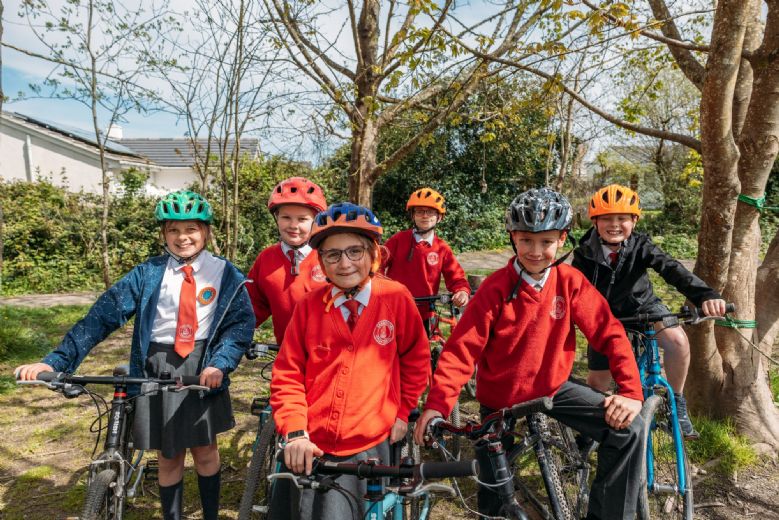
‘Intelligence and skills can only function at the peak of their capacity when the body is healthy and strong.' John F Jennedy.
Intent:
Charlestown Primary School aims to develop every child to be physically literate, i.e. having the motivation, confidence, physical competence, knowledge and understanding to engage in physical activities, leading to a lifelong adherence. This will be achieved through weekly PE lessons, in a wide range of physical units, which covers the National Curriculum, with extra opportunities at active break/playtimes; active trips/residentials; through optional extra-curricular clubs and inter-school sporting opportunities throughout both key stages.
Implementation:
Learning the fundamentals of Agility, Balance and Coordination (ABC) from the start of school, in EYFS and KS1, pupils and then able to start playing modified games (including attacking and defending); athletics skills (such as running, jumping and throwing) and simple dance patterns. By KS2, a broader range of skills is taught, transferring skills between traditional sports units (including gymnastics, athletics, invasion games and racket sports) dance, swimming (including water safety) and Outdoor and Adventurous Activities (OAA). Communication, tactical awareness and health benefits are taught in greater depth as the years progress. Our inclusive curriculum is therefore designed to achieve these goals, utilising the consistent and progressive programme of study across all year groups.
Additionally, PE develops cardio-vascular health, flexibility, power and muscular endurance fitness, with creative skills and social aspects of sport an integral aspect of lessons too. The significant benefits of exercise to mental health and improving learning in the wider curriculum is appreciated and taught to pupils. Throughout their schooling, all children are taught to be determined to achieve their Personal Best (PB) through engagement and enjoyment in a wide variety of physical activities. Children learn to evaluate their performances and collaborate with others, demonstrating good sportsmanship.
At Charlestown, we encourage healthy competition for all pupils against themselves, verses their peers and outside of curriculum time, in our extra-curricular sports clubs, utilising our superb facilities, which includes an astro-turf pitch and multi-purpose track. Charlestown is a leader in county inter-school sports competition participation and success – entering as many pupils as possible in inter-sports competitions and active events.
Impact:
Following the progressive single scheme of work throughout all years, pupils build upon their physical literacy to be confident and competent to perform in a comprehensive range of individual and team sports, dance and OAA experiences. Charlestown children are not focused solely on their physical fitness development, but understand the creative, social and mental benefits to exercise and sporting challenges. They are able to evaluate their own and others’ performances, thinking about tactics to improve within the rules of the game or activity. Teachers provide pupils with the facilities and resources required to maximise their active learning time. From the initial warm-ups to skill development and isolated group work, by the end of the unit pupils enthusiastically take part in a game or performance – showing sportsmanship and appreciation of their peers.
What do pupils at Charlestown say about learning in PE?:
"There are lots of opportunities inside and outside of school to learn different sports and compete in nearly all of them,”
“We have great places to use for PE, such as the field, astro and bike track,”
“I think Mr Bone’s games are exciting, fun and fair,” Year 4 pupil.
“I like PE lessons because I like being strong, running and doing fun things,” Year 1 pupil.
Curriculum Documents
Reading
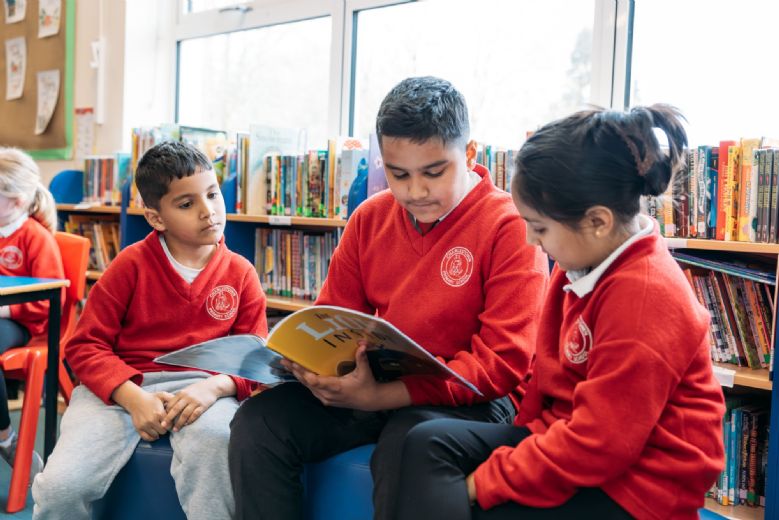
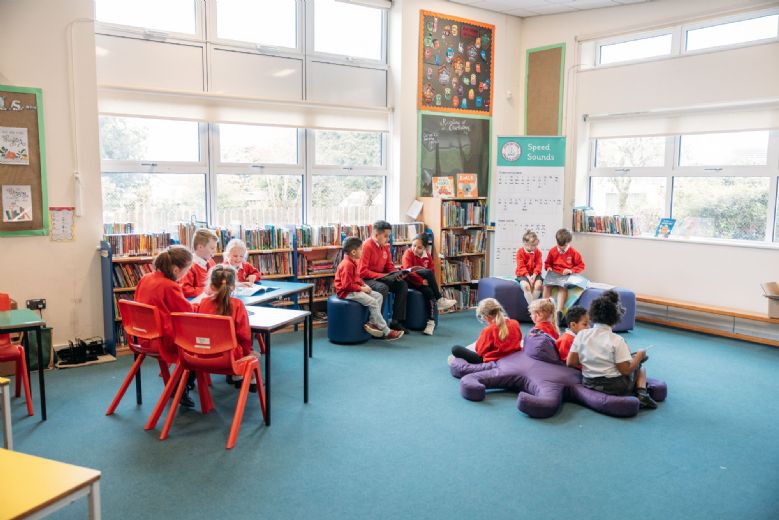
'There is more treasure in books than in all the pirate’s loot on Treasure Island’ - Walt Disney
Intent:
Our reading curriculum is designed with the intent to instill a lifelong love of reading in every child. We aim for each student to leave our school as a passionate and fluent reader, equipped with a deep appreciation for literature. By exposing them to a diverse array of books and authors, we inspire them and broaden their horizons. Our curriculum strategically links reading materials to various subjects, enriching their overall knowledge and fostering a well-rounded education. This ensures that reading becomes an integral part of their academic and personal lives.
Implementation:
We implement our reading curriculum through high-quality teaching centered on carefully selected texts. Our teachers serve as exemplary models of fluent reading, guiding students with precision and enthusiasm. Lessons are structured to develop fluency and comprehension, incorporating extensive discussions and engaging activities. A significant emphasis is placed on vocabulary acquisition, opening up new worlds of information and literary exploration for our students. By doing so, we make sure that each child receives an exciting and diverse reading education.
Impact:
The impact of our reading curriculum is evident in the confident readers and articulate speakers our students become. They gain extensive knowledge across a wide and varied curriculum, supported by their reading experiences. Our students leave school not only with a genuine love for reading but also with a determination to continually explore and expand the range of books they engage with. This foundation prepares them for future academic success and a lifelong journey of learning and discovery. Ultimately, our goal is for every child to view reading as a key to unlocking their full potential.
What do pupils at Charlestown say about learning in reading?:
“ I love that we get to read new books that are all different. I really enjoy listening to our teacher read our class story because they are a brilliant storyteller!”
“ Reading lessons are great because we get to discover new books and dive into the details of a story”
“Reading lessons are fun because you get to find and discover books that I would never have chosen!”
To view information on the Silver Stories project, please click here.
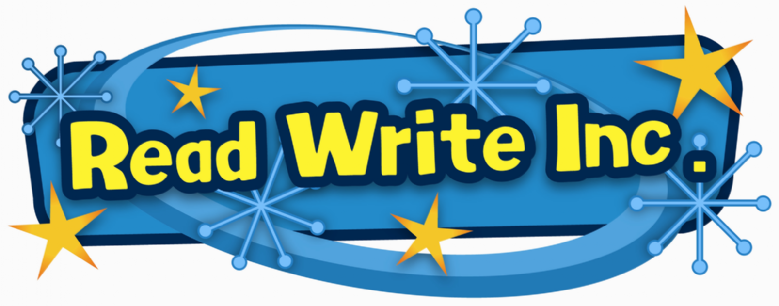
At Charlestown Primary School, we use the ‘Read Write Inc’ phonics programme designed by Ruth Miskin to teach early reading. The structured programme helps all children learn to read fluently and at speed so they can focus on developing their skills in comprehension, vocabulary and spelling. At the core of the programme is the lively and vigorous teaching of synthetic phonics. Children learn the 44 common sounds in the English language and how to sound-blend words for reading (decoding) at the same time as developing handwriting skills and spelling (encoding).
We have found that by using the Read Write Inc. programme, children experience success from the very beginning of their reading journey. Lively phonic books are then closely matched to their increasing knowledge of phonics and as children re-read stories their fluency increases. The stories include prompts to support thinking out loud and discussions, helping children develop the skills they need to be successful storytellers.
Read Write Inc. lessons are fun and engaging and all staff who deliver the reading sessions are fully trained. The lessons are taught daily and pupils are regularly assessed and grouped to enable appropriate challenge and pace throughout the programme.
Curriculum Documents
Religious Education
Introduction to Religious Education
‘Religious education contributes dynamically to children and young people’s education in schools by provoking challenging questions about meaning and purpose in life, beliefs about God, ultimate reality, issues of right and wrong and what it means to be human’ (SACRE 2020).
We use the 2020 SACRE, which offers a broad and rich RE curriculum using a scaffolded approach to build on children’s knowledge and understanding of a range of faiths, including religious and non-religious world view. Lessons offer provision of high quality, coherent and progressive experience of R.E, with scope for cross-curricular and experiential learning, as well as identifying links between different faiths. Through each unit, children will know about and understand a range of religions and world views. There is a strong emphasis on respecting the views of others and learning to discuss differences of view confidently and respectfully to ensure children develop positive attitudes and values and to reflect on and relate their learning in RE to their own experiences. The intent is to make sure that children understand the relevance of RE in today’s modern world and how it affects our lives.
Each unit has a ‘Big Question’ (which is broken down into smaller focus questions in all religious and non- religious units except the Understanding Christianity Units). Smaller questions build pupils learning to answer their ‘Big Question’ and all lessons begin and end with this focus. Skills progression includes theology, philosophy and social science. Learning builds through the year with a thematic focus by the summer term. This gives pupils the opportunity to learn about a range of faiths which they compare and contrast in their final unit.
Objectives
- Pupils learn about religions and beliefs in local, national and global contexts, to discover, explore and consider different answers to these questions.
- Pupils learn to weigh up the value of wisdom from different sources, to develop and express their insights in response and to agree or disagree respectfully.
- Teaching should equip pupils with systematic knowledge and understanding of a range of religions and beliefs, enabling them to develop their ideas, values and identities.
- RE should develop in pupils an aptitude for dialogue so that they can participate positively in our society, with its diverse religions and beliefs.
- Pupils should gain and deploy the skills needed to understand, interpret and evaluate texts, sources of wisdom and authority and other evidence. They should learn to articulate clearly and coherently their personal beliefs, ideas, values and experiences while respecting the right of others to differ.
Curriculum Documents
Relationships, Sex and Health Education (RSHE)
Introduction to RSHE
‘Education is the most powerful method you can use to change the world’ Nelson Mandela
Intent:
The intent of our personal, social, health and economic (PSHE) curriculum, is to deliver a holistic ethos which pervades through everyday life, as well as a curriculum which is accessible to all. We endeavor to maximise the outcomes for every child so that they know more, remember more, and understand more and by completing their programme of study for each year group. At Charlestown Primary School, PSHE education is inclusive and enables all our children to become healthy, independent, and responsible members of a society. It aims to help them understand how they are developing personally and socially, and tackles many of the moral, social, and cultural issues that are part of growing up. We provide our children with opportunities for them to learn about British Values and appreciate what it means to be a member of a diverse society. Our children are encouraged to develop their sense of self-worth by playing a positive role in contributing to school life and the wider community.
At Charlestown Primary School we seek to use PSHE education to build, where appropriate, on the basic school curriculum and in statutory guidance on: drug education, financial education, sex and relationship education (SRE) and the importance of physical activity and diet for a healthy lifestyle. The Jigsaw scheme of work is set out into six sections, which are:
- Being Me in my World
- Celebrating Difference
- Dreams and Goals
- Healthy Me
- Relationships
- Changing Me
Implementation:
At Charlestown Primary School we follow the resources embed in the Jigsaw scheme within a whole school PSHE programme. Jigsaw is split up over 6 themes across the year and can be adapted to meet the needs of our children. Learning is contextualised and made relevant to real life experiences in order to motivate, stimulate and engage children and help them understand how they can apply their learning in their everyday life. The scheme of work covers:
- Risk Taking/Safety
- Diversity
- Emotional Health and well-being
- Coping Strategies
- Healthy Eating
- Healthy Relationships
- Friendships/ bullying
- Puberty/ Growing up
- Financial Education
- British Values
- Democracy
- Economic well-being
- Citizenship
- Physical Activity
- E-Safety
- Careers
- Substance Misuse
- Tobacco
- Sex Education
The Jigsaw scheme of work developed for our pupils, assemblies, and ethos of the school, includes opportunities to link British Values, SMSC (spiritual, moral, social and cultural development) and the school’s key skills into the curriculum. The curriculum starts in the early years and follows the children through to Year 6. The distribution of the lessons complements key campaigns throughout the year such as Anti-bullying week, Black History month, Remembrance Day. These are often seen displayed throughout the school.
Teachers plan for open learning activities which suit the ethos of PSHE and very much support speaking and listening, as communication is another aspect that addresses the needs of our children. All learning activities provide an opportunity for children to develop their skills, knowledge and attitude: never underestimate the impact of children debating or discussing; even practising using language or talking about feelings can help them develop key skills for the future.
Impact:
- Children will learn how to keep themselves and others safe.
- Children will demonstrate and apply the British Values of Democracy, Tolerance, Mutual respect, Rule of Law and Liberty.
- Children will have an understanding about relationships, friendships and how to communicate with people.
- Children will demonstrate a healthy outlook towards school which will help with attendance and behaviour.
- Children will build emotional resiliency and become responsible members of society.
- Children will be on their journey preparing them for life and work in modern Britain.
- Children will be able to use their learning throughout the other subjects and general life experiences.
At Charlestown Primary School we believe that we deliver a curriculum that best suits the needs of our children. We believe that the purpose of PSHE education is to build, where appropriate, on the statutory guidance outlined in the Relations Education, Relationships and Sex Education (RSE) and Health Education.
We believe that PSHE plays a vital part of primary education and as well as discrete focused lessons, it is also embedded throughout the curriculum and school ethos. PSHE is integral to the development of children’s values for them to become a positive citizen in a forever changing community. PSHE is an important part of school assemblies where children’s spiritual, moral, social and cultural curiosity is stimulated, challenged and nurtured.
What do pupils at Charlestown say about learning in …..?
‘I like learning about how can I can be a good friend. It’s important we know how to be good learners and good friends’ Year Two.
‘I like setting a target for myself and thinking about how I can make sure I get better at something.’ Year Three.
‘Learning about being healthy is important. We talk about it a lot in our class. We all have a chance to talk and it doesn’t matter if you get something wrong or you don’t know something.’ Year Five.
‘After our Jigsaw lesson, sometimes I put questions in our ‘I wish my teacher knew...’ box.’ Year Six
Curriculum Documents
Science
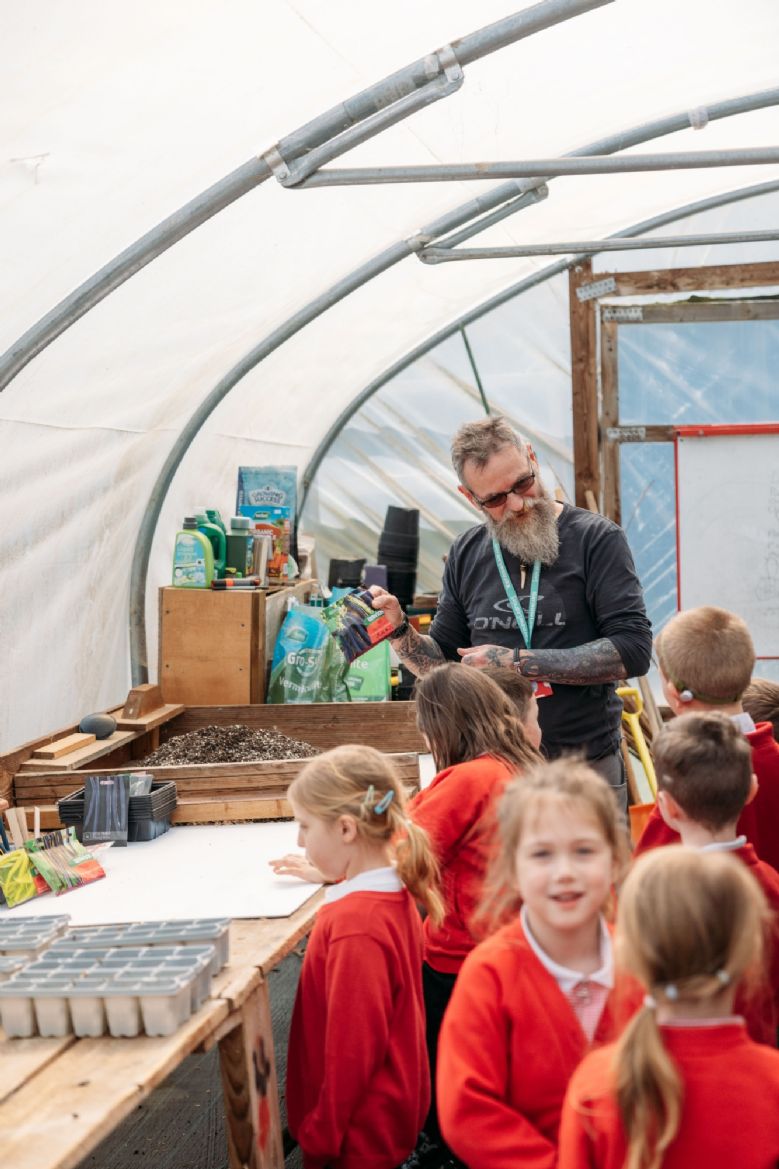
‘The important thing is to never stop questioning.’ Albert Einstein
Intent:
Science and Engineering are rapidly growing and important industries in the modern world. Even if children do not become scientists or engineers, they will grow up in a world that requires scientific literacy and critical thinking skills. Science is all around us and helps children to make sense of the world
Our intent to enthuse and inspire children to develop a love of science is reflected in our curriculum and enrichment activities. We intend to…
- Provide an exciting, inclusive and inspiring science curriculum
- Develop scientific knowledge and conceptual understanding through the specific disciplines of biology, chemistry and physics
- Develop the essential scientific enquiry skills to help children to deepen their scientific knowledge
- To provide opportunities for learns to explore and learn scientific vocabulary, to support their understanding and communication in science
- Encourage children build a strong science capital, gaining high aspirations and knowledge of possible careers
Implementation:
At Charlestown, we believe that scientific investigation is one of the most powerful ways to learn; developing curiosity and perseverance as well as challenging what we know about the world. Through purposeful, practical and child-led enquiry, pupils are given opportunities to explore, question and be challenged in order to develop a deeper understanding of the world around them and encourage them to be inquisitive, independent thinkers.
We ensure that our children:
- experience awe and wonder of the world,
- collaboratively investigate an exciting, inclusive and inspiring curriculum,
- explore scientists, careers and real-life examples that build their science capital and develop their aspirations for the future.
On the journey across the school, children become increasingly more independent, completing pupil led investigations, selecting resources and choosing their own strategies for recording. Pupils’ enthusiasm for science in our school is clear. Extra-curricular events and science weeks have been a huge success.
Pupils learn through practical activities that link to the real world and through discussion. Working scientifically skills are embedded in our curriculum. A scientist questions, predicts, observes, records, analyses and evaluates. All children can be scientists by following their own natural curiosity and at Charlestown, teachers emphasise these skills in order for children to flourish. Our school strongly encourages the use of subject specific vocabulary and through effective teaching of science we develop children’s knowledge and key skills during each unit of science.
We implement our Science curriculum using the following tools:
- Knowledge organisers
- Vocabulary focus
- Challenge and stretch cards
- Practical investigations cover a wide range of enquiry approaches
- A wide range of high-quality resources such as Developing Experts and Explorify
- Whole school assessments on working scientifically skills
- Regular science events and enrichment (including science week)
A variety of teaching styles are used to teach science. The main focus is to provide practical and investigative activities that enable children to develop their knowledge, understanding and skills through first-hand experience. At Charlestown we acknowledge that science is a practical subject and should involve the children in investigative work as far as possible.
Although we strongly recognise the need for discussion between children in pairs and groups, we also recognise that there are times when a more formal ‘chalk and talk’ style is necessary along with demonstrations by the teacher to avoid misconceptions.
On-going formative assessment will be used to assess children’s scientific knowledge, understanding and skills, whereby teachers constantly assess children’s understanding on a lesson to lesson basis. Specific assessment opportunities are used to assess working scientifically skills and children’s progress against these skills are tracked across their time at school.
Impact:
The impact of our Science curriculum is evident in the following ways:
- Science is a high-profile subject in the school community (evidenced in questionnaires)
- Children gain a deep and robust scientific knowledge that builds on previous learning (evidenced in highlighted learning intentions and end of unit tests)
- Children have strong scientific enquiry skills that build on previous learning (evidenced in Whole School Assessments and lesson enquiry starters)
- Children have good knowledge and understanding of scientific vocabulary, applying it in their learning
- Children develop high aspirations (evidenced in questionnaires)
What do pupils at Charlestown say about learning in …..?
‘I liked learning about plants. I liked planting the seeds in different places to find out where they were going to grow best.’ Year One
‘My favourite lesson in Year 3 was when we explored different rocks. We found out all about fossils’ Year Three
‘I like setting up experiments. It’s good when things go wrong because it tells us about how we can do the experiment even better next time’ Year Six
Curriculum Documents
Writing
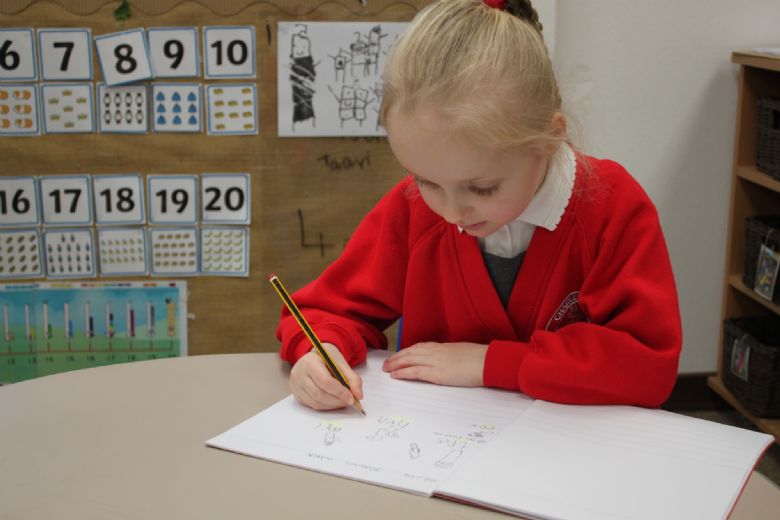
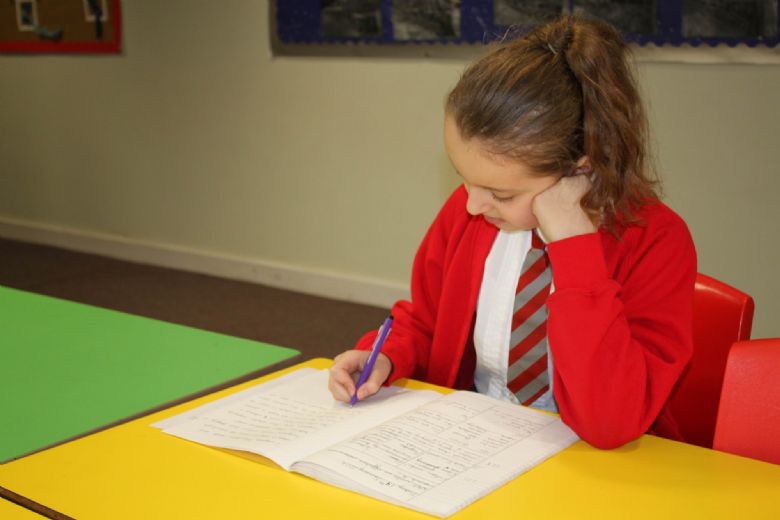
You can make anything by writing’ C.S. Lewis
Intent
Writing is a crucial part of our curriculum at Charlestown Primary School. It is our aim to ensure that our pupils develop a love of writing, where they are able to use effective and appropriate vocabulary, which has an impact on the reader. We want them to write clearly, accurately and coherently, adapting their language and style for a range of contexts, purposes and audiences. We strive for our pupils to develop independence, where they can identify their own areas for improvement in all pieces of writing, editing their work effectively during and after the writing process. We also intend to develop writers who are confidently using the essential skills of grammar, punctuation and spelling. At Charlestown Primary School, we set high expectations for all pupils; to take pride in their work and have a fluent handwriting style, alongside allowing their imaginations to flourish. A secure basis in speaking, listening, reading and writing is crucial to a high-quality education and will give our children the tools they need for success in later life.
Implementation
We implement our writing curriculum through a ‘sentence stacking’ approach, which enables pupils to build their skills in structured writing sessions with their teachers. Modelled writing by the teacher using focused ideas, tools and techniques ensures clarity and cohesiveness with clearly outlined expectations. This approach allows children to build their writing one sentence at a time and delve into the vocabulary and technical aspects of sentence structure. We emphasise the importance of editing, teaching children to refine their work to produce the best possible final piece. This ensures a comprehensive development of their writing abilities.
Impact
The impact of our writing curriculum is evident in the high levels of engagement and excitement our pupils show for writing. They develop the ability to express themselves through a range of written pieces, becoming confident and proficient writers. The quality of their stories and formal compositions showcases their mastery of writing skills. Our pupils leave school with a strong foundation in writing and the ability to express their ideas clearly and effectively in various contexts.
What do pupils at Charlestown say about learning in writing?
“I like writing because it is fun, and you can use your imagination.” -Year 2 child
“I like that the teachers can help you with ‘writers block’ by giving you examples and ideas.” -Year 3 child
“I enjoy sharing my writing with the class and sharing our ideas. I sometimes use the teacher’s ideas and they are good for children that are struggling.” – Year 4 child
“What I love most about writing is the freedom to create our own pieces of writing after we have had help from the teacher’s modelled one. I also like using the words from our vocabulary wall to improve my writing.” – Year 5 child
Curriculum Documents
